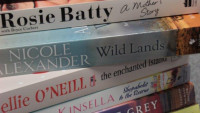
Stella women's literary prize picks battle with non-existent enemy as it fights 'male gender bias' in the book industry
skynews.com.au – Sunday July 13, 2025

Australia's 2026 Stella Prize - for women authors - includes a male judge.
If inclusivity is embraced to the extent that gender is no impediment to judging a gender-specific prize, then inclusivity has been rendered relativist to the extent of being just ideology with good branding.
Paradoxically, it would be considered insensitive, in the current climate, to allege that a male judge was hindering representation and the distinctive voice of dozens of prospective female judges, whose lived experience and perspectives as women might make them inherently more suitable as a judge of a literary prize from which men are exempt as entrants.
The Stella Prize claims to fight for gender equality.
The Stella website says it “takes an intersectional feminist approach to privilege and discrimination. We are committed to actively dismantling all structural barriers to inclusion for women and non-binary writers”.
This is a sociocultural delusion, ignoring that the publishing industry is disproportionately, almost overwhelmingly dominated by women - roughly 60 to 70 per cent of Australian novels published in recent years have been written by women.
The most up-to-date Lee & Low publishing survey found that 71 per cent of people in the US industry are women, including 74 per cent in editorial roles, 70 per cent of book reviewers, and 78 per cent of literary agents, with that number replicated in a scroll through the Australian Literary Agents Association website.

Writing Advice and Literary Wisdom from the Great E.B. White
lithub.com – Saturday July 12, 2025

E.B. White, beloved children’s author (Charlotte’s Web, Stuart Little, The Trumpet of the Swan), innovative and revered essayist, and co-editor of the indispensable The Elements of Style, celebrates a birthday today. He was born in Mount Vernon, New York, on July 11, 1899. A deeply private man, White, whose full name was Elwyn Brooks White (his Cornell University nickname was “Andy”), had an abiding love for nature and ecology, most evident in his children’s books and essays.
His first publication appeared in The New Yorker in 1925. He went on to become a contributing editor for the magazine in 1927; in this capacity he wrote over 1800 articles. He was credited by famed New Yorker editor William Shawn for inventing a new literary form—the magazine’s “Comment” essay: often personal, incorporating the writer’s first person experience, while also being critical and incisive, as well as accessible to a wide readership. E.B. White loved writing, and given his prolificacy across multiple genres, this versatile wordsmith had some sage advice when it came to craft. Here are some of his most interesting thoughts on writing, creativity, and the majesty of the written word.
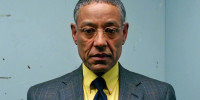
The Secrets to Writing Unforgettable Villains
nofilmschool.com – Tuesday July 8, 2025

When you're working on a screenplay, you spend so much time making sure the hero pops out and the plot makes sense that oftentimes, the villains can be left behind.
But if you want a movie or a TV show to really stand out in the audience's mind, or attract some great actors, you need the villain to be unforgettable.
Today, I want to look into the YouTube video I watched about how screenwriter James A. Hurst works to create memorable villains.
Let's dive in.
Create an Unforgettable Villain
Look, screenwriting is hard. It can take me forever to finish a script and to really craft it in a way that connects with an audience.
So if people have "tricks" or "shortcuts" to do this stuff, I'm all ears. That's why I was pumped to watch this video.
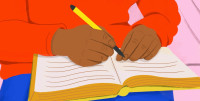
"Your main character doesn’t need to be perfect but they must be relatable": Brilliant writing advice from a top literary agent
goodhousekeeping.com – Saturday June 28, 2025

As the literary agent to some of the best writers around - Sara Collins (winner of the Costa Debut fiction award), Jing-Jing Lee, Jennie Godfrey, Bryony Gordon and Candice Carty-Williams are among her clients - Nelle Andrew knows pretty much everything there is to know about what makes a good book. Here she shares some of the best writing advice from her 20 year career.
1 Creating believable characters
The characters should drive the story, not the other way around. Make your main character compelling, with flaws, desires and agency. Readers should care what happens next because they care about who it’s happening to. I fall in love with the voice first. If the voice doesn’t hook me, I won’t keep reading, so ensure your narrative voice is distinctive, confident and consistent. Your protagonist doesn’t need to be perfect, but they must be relatable and motivated. Avoid stereotypes: nuance and specificity will set your characters apart.
2 Show, don’t tell
Avoid overly expositional writing. Every sentence should serve a purpose – either to develop a character, advance the plot or build atmosphere. Use action, dialogue and internal thoughts to reveal emotions and themes. Avoid telling the reader what to feel – let the story, and the characters within it, evoke feelings. And don’t overwrite; clarity, rhythm and authenticity matter more than big words.

The Odd Over the Obvious
slate.com – Saturday June 28, 2025

This spring’s hot topic of conversation for my colleagues in higher ed was that “Everyone Is Cheating Their Way Through College” article in New York magazine. Most of the fellow professors I spoke with about this were horrified by how often students now can and do let A.I. write their papers. Others are joining their students in asking, Why not?
A surprising coalition—William Shakespeare and 17th-century scribes, as well as 21st-century elementary school teachers, anti-fascist scholars, and epidemiologists—would tell you why not.
A key principle for 17th-century scholars transcribing or translating classical or biblical texts was lectio difficilior potior: The reading that is stranger is stronger. If a word differs between two versions of the text you’re working on, you should actually choose the one that seems to make less sense. That surprising word choice is likelier to have been the original author’s meaning, because it’s likelier that a previous copyist, translator, or (eventually) typesetter replaced a surprising word with one that was more predictable than vice versa. The wisdom was: Don’t let an easy, commonsensical option erase a unique and potentially more interesting and challenging statement.
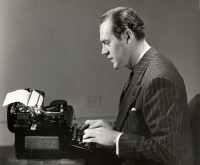
The Plight Of The White Male Novelist
defector.com – Tuesday June 24, 2025

In July of 2022, Joyce Carol Oates tweeted that her literary agent friend told her editors are no longer interested in reading first novels by young white male writers, “no matter how good.” She was saying this in support of an article by former New York Times columnist Pamela Paul, who argued that the publishing industry is being destroyed by “illiberal scolds” keen to stifle free speech. Among Paul’s examples are the industry’s recourse to sensitivity readers, who ostensibly scold authors, and the backlash against 2020 bestseller American Dirt on the grounds that its white author Jeanine Cummins was not the right person to tell the story of poor Mexican migrants. Paul is implying, in other words, that calls for publishing to address its whiteness problem amount to a form of woke censorship. In sharing Paul’s piece and adding her own anecdote about young white men being overlooked, Oates was connecting their fate to Paul’s complaint: White men are the victims of the industry’s takeover by the DEI mafia.
The idea that white male writers today face diminishing opportunities has since occasioned considerable debate and several attempts to lay out in greater detail the forces behind their recent marginalization. Jacob Savage’s explanation is that they are “vanishing” because, having been castigated as toxic masculinists and told there are no “Good White Men,” they no longer feel that they are allowed to have a voice. Tim Lott argues that an industry now dominated by women editors and agents, who are naturally biased toward manuscripts that center their own experiences, is guilty of the same inequality that women once complained about, except now it is men who are excluded.

What can right-wing authors do?
thecritic.co.uk – Monday June 23, 2025

Writing has always been a lonely business, publishing a cruel one. We aspiring novelists know that better than anyone. (Which of us hasn’t scrolled through endless Famous Writers Who Got Rejected blog posts, taking a perverse sort of pride in receiving more No Thank Yous than William Golding and J.K. Rowling combined?) Given the sheer number of query letters literary agents are swamped with every week, how is our literary potential — assuming, of course, that we have any — ever to be spotted?
These days, though, there’s an even greater obstacle in our path: left-leaning gatekeepers. And when I say leaning, I mean tumbling. For those of us who don’t subscribe to the latest ideological fads, the chances of seeing our books in the hands of readers who don’t share our name or flat have grown depressingly slim.
When researching agents and publishers for my children’s book, for instance, I found very few who did not explicitly ask for stories by or at least featuring disabled, neurodivergent, LGBTQ+, ethnically diverse or feminist voices. If only I’d penned a middle-grade novel about two feisty trans-girls of Nigerian extraction on their first trip to the moon in a wheelchair. Whether masterly or not, my own manuscript, with its podgy, posh, wannabe-centurion narrator, was bound to be dismissed out of hand for its lack of “diversity”. It’s difficult not to become disheartened.
I was therefore delighted when earlier this year The New Culture Forum (NCF) announced its first Literary Festival. It promised aspiring authors both practical guidance and the presence of publishers. Announcing the festival on GB News, the director and founder Peter Whittle said, quite rightly, that there would be no point to it unless it helped non-woke writers to get published: ‘it can’t just be a talking shop.’

Kate McKean on the Nuts and Bolts of the Query Letter
lithub.com – Friday June 20, 2025

A query letter is a cover letter. That’s it. I know it’s not that simple, but I really want to take away some of its power. Yes, sometimes that’s all an agent will see of your work. Yes, that means it has to do a lot in a little space. But trust that agents recognize how hard this part is, and we know how to spot something interesting through all your nervousness and posturing and meaningless typos.
I like to break down queries into several smaller parts so you can tackle them one by one, and then make it your own.
Salutation
First, we start with a salutation. This is a letter, after all. You should address it to someone. Dear Kate is an acceptable salutation. Yes! Even my first name! I don’t care.
If you are not comfortable with that, you can write Dear Ms. McKean. If you are not sure of an agent’s gender, honorific, or marital status, you can write Dear Kate McKean. All fine options! Just avoid assuming a gender binary or anyone’s marital status. Please do not write To Whom It May Concern or Dear Agent. That just makes me feel like another number on your list. If you spell an agent’s name wrong or use the wrong honorific, just take a deep breath. It’s OK! Typos happen! Lots of people think my name is Kate McLean for some reason. We understand. Do not fall on your sword in follow-up emails. You may send an apology email if you must, but queries are hard and we are all human. Try better next time.

What Writing For Kids Taught Me About Killing Off Adults
crimereads.com – Thursday June 19, 2025

In writing for children, suspense often takes the form of whispers. A note slipped across a desk. A shift in a friend’s tone. A secret whispered during a sleepover. When I dove into writing an adult thriller, those whispers darkened into something more sinister: gaslighting, betrayal, sabotage. Humans hurting other humans on purpose, in terribly cruel ways. Are You My Mother? is a far cry from The Perfect Mother, to be sure, but leaping from one genre to the other wasn’t as arduous as you might think. In many ways, writing for kids taught me exactly what I needed to know to write for adults, especially when it came to thrillers.
The tools, after all, are remarkably similar. It’s the stakes—and the monsters—that change.
Pacing Is Non-Negotiable
Young readers are merciless. If a book fails to grip them right off the bat, that’s it. They’re done. In writing middle grade and YA novels, I learned this quickly. Each scene had to earn its place. Every page had to pull its weight. Long internal monologues or quiet ruminations? Forget it. Momentum was king.
This same discipline became essential when I turned to writing a thriller. In this genre, pace isn’t simply about avoiding boredom; it’s about tension. The plot must press forward, dragging the reader along whether they like it or not. Whether it’s a dead body on page one or a marriage unraveling by chapter three, the story’s engine has to stay hot. Writing for kids taught me how to keep that engine running. When in doubt, I cut ruthlessly, the way years of facing impatient twelve-year-olds trained me to do.
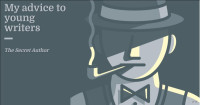
My advice to young writers
thecritic.co.uk – Sunday June 15, 2025

You are, let us say, a “young writer” on the south side of 40, chastened by the findings of the latest industry survey — these show that the mean authorial salary is around £7,000 p.a. — but with your first book contract lying on the desk before you.
The Secret Author would like to congratulate you, whilst proffering a few tips on how you might be able to sustain the career on which you have so optimistically embarked.
Civility is all. The old adage about being polite to the people you meet on the way up as you may very probably meet them again on the way down was never truer than on Grub Street.
Have a smile ready for the shy girl checking the proofs at the Literary Review: she will doubtless end up editing Vogue. The junior assistant who brings in the tea at Front Row is almost guaranteed to be controller of Radio Four 30 years hence.
The same rule applies to book reviewing. The author of the feeble novel you trashed in 2019 will, inevitably, be judging the literary prize for which your darling work is entered in 2029; no slight is so mild that it won’t be repaid with interest decades down the line. The Secret Author is still having trouble with a woman whose book he made the mistake of mildly disliking back in 1995.
Watch your politics. Whatever your private ideological leanings, always publicly proclaim an attachment to the left-liberal Guardian/New Statesman/London Review of Books line. Nobody ever got anywhere in the modern literary world by saying that they voted for Brexit or claiming that Nigel Farage is unfairly maligned.
Similarly, make sure you return publishers’ diversity surveys with all the right boxes ticked. If you were privately educated and went to Oxbridge, either keep quiet about it, make wry, self-deprecating excuses, or say things like “at least at college you could meet real people for the first time”.
Notwithstanding the previous paragraph, always try to write for right-wing newspapers and magazines instead of left-wing ones. The former pay better, do so on time, tend not to muck you about editorially and give better parties.
Get the free newsletter | Submit a news item or article | Get Writers' News for your website





